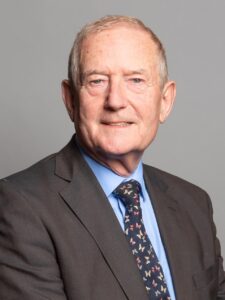Jess Phillips has revealed how she used to live on less than 500 calories a day during a hellish battle with anorexia

Jess Phillips has revealed how she used to live on less than 500 calories a day during a hellish battle with anorexia that saw her weight drop to just seven stone.
Speaking exclusively to GB News, the Labour MP admitted she starved herself as a teenager, and that she would now have “disordered eating” for the rest of her life.
In a candid interview the mother-of-two also opened up the “incredibly hard” decision she made to have an abortion. She said she was speaking out as she wanted to help other women avoid the ordeal she faced when she went about undergoing a termination.
Speaking to Gloria Meets on GB News, the MP for Birmingham Yardley also opened up about her last tilt at trying to become Labour leader – and refused to rule out another run at the top job.
Revealing why she withdrew from the leadership contest last time round, Jess told Gloria De Piero: “There were a few reasons. One, I hated it. I absolutely hated it, I hated everything about it, it made me feel miserable from the very second that I agreed to do it. I felt sick, and I wasn’t enjoying it at all.
“I remember it was Christmas, and just having to go to one thing and have like five people standing around me telling me what to do. I was like, “Oh my God, I’ve got to get my kids some Christmas presents”, and then I was running around the shops before going back to something else, I just hated it.
“I like going out dancing with my friends, I like being a normal human being, I like living a life and I hated not being able to do that. The second reason was: there was no way that I was going to win, and so why would I put myself through something so grim? Keir Starmer was very clearly on the pathway to success.
“But one of the reasons that I did it was to open up the Labour Party to people who aren’t that interested in politics – which I think I have a particular skill for – and get loads of people to join the Labour Party.”
On whether she will stand again she said: “I mean, I’m winding down now anyway; I don’t go out dancing with my mates as much anymore – Covid’s put off my desire to go out dancing. But I think it’s probably quite unlikely. I wouldn’t say never, I wouldn’t say that I would never run again because I just don’t think that’s honest, because I might do. But I really can’t deal with the machine, I’m not good ‘in the machine’.”
Talking about what led her to first start championing women’s rights, she said: “I think working in women’s refuges, you come across certain cases, and I worked in women’s refuges and with victims of sexual exploitation and grooming for years before becoming a Member of Parliament.
“There was one particular case of a young woman; she lived in the care system, was abused as a kid. She was put into prostitution as a kid and later had her children removed from her. And she would just spring back into service, and I just thought that every single agency, every policy that anyone had ever tried – with good intention – had just failed this kid. And when I say she was a kid, she was probably about the same age as me at the time, but she presented as a sort of teenager. I remember just thinking, “God, you know? We’re doing something wrong, and constantly we’re doing something wrong, and I’ve got to try and get into politics to change those systems”.
“I think about her almost daily. I don’t know what happened to her. I doubt it was good. But yeah, this sort of constant failure that I watched women and children go through as a worker, I think that almost certainly is the thing that made me decide to step up.”
Revealing how she battled anorexia in her teens she said: “It’s almost impossible to say, what sparked it really. I can’t remember. There was no definitive moment. I mean, I was a teenager in the 1990s, and being anorexic was pretty de rigueur. It was when we sort of first knew about it all, and quite a few of my friends were very, very severely ill – hospitalised, institutionalised. They had very, very severe anorexia and thankfully I was never at that level. It was never really about being thin. I was really thin when I was teenager.
“At first, you tell yourself – because you’ve been out on the lash or something – that you’re making yourself sick to feel better after being drunk. So, I think I sort of started with that. And then it became sort of like my personality, like, my friends would say, “Oh, she’s always vomiting, isn’t she?”, or “She’s always sick when she’s drunk”, or something.
Jess said the disorder became much worse when she went to university.
“When I went to university, my parents were really quite strict about eating healthily,” she said. “So, I just ate pizza all the time and it became really quite unhealthy, and I put on weight. Then, in the reaction to that, I lost a lot of weight. I mean, there was about a year where I only ate popcorn. My calorie intake must have been, I mean, literally less than 500 calories a day. I would starve myself. I became so controlled about the things that I ate that when I left university, I must have been about 7 stone, and I’m 5 foot 8.”
On how she believes she will be fighting against the condition for life she said: “I will have disordered eating for the rest of my life. You know, I emotionally eat. I will drop my weight massively and dramatically. I’m absolutely brilliant at going on a diet. When people say to me, “How do you stick to it?”, they’re sort of jealous of it. I’m like, “It’s not necessarily a good thing that I can stick to this”. I am obsessive; I am all one way or another, and it’s like an addiction of any sort, that you will overeat to cover your emotion and you will then undereat to feel in control.
“I wish I could stop it, but that’s life, isn’t it? It’s not causing me any particular grief at the moment, it is just the way that I live. I mean, I’ve got family; I eat with them most of the time. My husband’s an excellent cook. I’m not unhealthy. I’ve tried to make it be about health, rather than anything else, but I’m frankly just kidding myself. I’ve been groomed all my life to think that women should look a certain way. I wish that I could say that I’ve felt differently, and my feminism has helped me feel differently, but I don’t.”
The mother-of-two also opened up her decision, 16 years ago, to have an abortion
“I would have been about 24,” she recalled. “I had my eldest son when I was 23, and he was something like five months old at the time. It was hard having a five-month-old baby. But yeah, it was incredibly hard being 23 and having a five-month-old baby, and then finding that I was pregnant immediately afterwards.
“Honestly, I still don’t actually know how it happened! I don’t remember my life at all at that time; it was just like living in a daze. But I remember, every single time I’ve been pregnant in my life, that moment I’ve seen the pregnancy test – I’ve known instinctively in that moment exactly what I felt about it and what I was going to do. And I’ve had a miscarriage as well as two live births, so I know that… and actually, on that occasion, I was not happy to be pregnant.”
“I knew instantly in that second when I saw the pregnancy test – I could hear my baby crying downstairs – that I didn’t want to have another baby. I went downstairs and I said to my boyfriend – now my husband – I said, “Oh God, I think I’m pregnant”, and he just put on a brave face, and was like, “I guess we’re going to have another baby”. And I was just like, “No”, and he was like, “Oh God, thank God, thank God”. But no, it wasn’t stressful. The thing that was stressful was waiting.”
Revealing the experiences she had when she tried to arrange the abortion she continued: “I had to go to the doctor, and my doctor said to me, in a sort of slightly judgmental way: “I don’t sign off for abortions, I don’t do it. We have a doctor in the practice who does that. I’ll make an appointment with her”.
“I just remember thinking, “OK, on moral grounds, you don’t do it, and you’re completely entitled to do that”. There isn’t another health area they’re entitled to do that in, incidentally. I think that if you go into the medical profession and you have very, very strong feelings about this then, you know, as long as there is a provision available – which at my GP surgery there was – I can see that you can work in that environment.
“But I think if you’re going into general practice where this might come up – it is a health issue, not a moral issue. It is a women’s health issue. So, I do think that we need to make sure that in every GP practice… and there are very vulnerable groups where that would, you know, that initial ‘no’ would be damaging. So, we’ve got to make sure that the patient is the principal, not the doctor’s morality.
“But, you know, there was a doctor – a lovely, lovely doctor – at my old GP surgery, who then had to sign it off for me, and then I had to go and get another doctor at the clinic to sign it off for me, because, as a woman I can’t make that choice by myself without two people signing it off.
“I don’t know why one doctor isn’t good enough to sign off my need for that. So, I then had to go and have a scan to date it, and then I had to wait for something like six weeks. And you know, I’ve got a new-born baby and I’m feeling sick, and it’s for nothing.
“When you feel sick when you’re pregnant – there’s a frisson of excitement about the fact that you’re gonna have a baby. But I felt so sick, and I really resented having to wait.”




